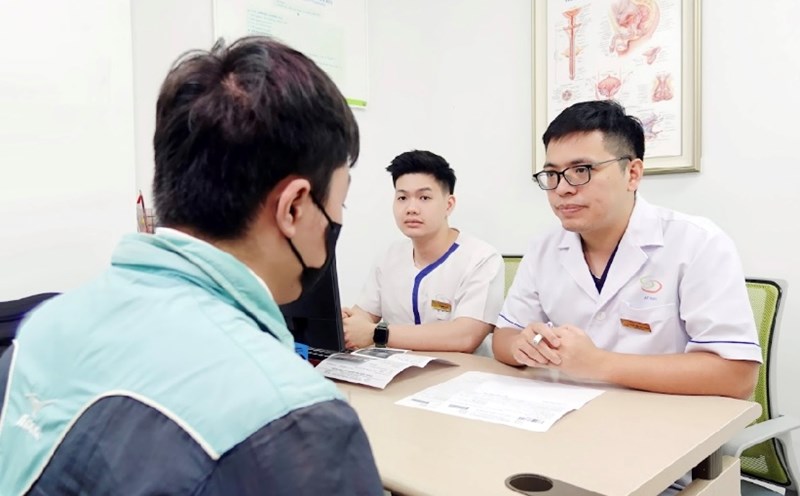A 49-year-old male patient (Hanoi) began to feel mild pain in the testicle area on December 27. The next morning, the pain became more severe, one testicle was tense and painful, the patient asked "Doctor Google" to search for information online and diagnosed himself with orchitis and self-administered antibiotics, pain relievers, and anti-inflammatories.
However, that afternoon, the condition became more serious. The patient's testicles were swollen and painful, making it difficult for him to walk, requiring assistance.
Early in the morning of December 29, the patient had to be hospitalized for emergency treatment. After examination, Master, Doctor Dinh Huu Viet - Head of the Department of Andrology (Hanoi Andrology and Infertility Hospital) - diagnosed the patient with testicular torsion - a dangerous andrological emergency that requires immediate intervention.
Testicular torsion is a condition in which the spermatic cord twists around its axis, blocking the blood vessels that supply the testicles, leading to swelling and congestion. If the torsion is left for too long and is not detected and treated promptly, the testicles may atrophy due to lack of blood supply or have to be removed due to testicular necrosis.
“The patient was admitted to the hospital with severe pain in one testicle. Previously, the patient had self-administered antibiotics and treated himself incorrectly. A Doppler ultrasound of the testicles showed a loss of pulse signal in one testicle, and the patient was diagnosed with testicular torsion.
By the time the patient arrived at the hospital, it was past the “golden time.” Both the patient and the doctor hoped that the surgery could save the testicle. However, during the surgery, the doctor discovered that the testicle was necrotic, so they had to perform surgery to remove the twisted testicle to avoid the risk of more serious complications. Four days after the surgery, the patient’s health was stable and he was discharged from the hospital,” said Dr. Viet.
Testicular torsion is an emergency condition that requires early detection and treatment. Within the first 6 hours, the testicular preservation rate can reach over 90%. This is the "golden time" for surgery to untwist and restore blood flow to the testicles.
The disease can occur at any age but is most common before or during puberty. Cases of testicular torsion in patients over 40-50 years old are rare.
Losing a testicle can have both physiological and psychological effects on the patient. Physiologically, the decline in the ability to produce testosterone - a hormone that plays a key role in men's health - is inevitable.
When testosterone levels are not maintained at a stable level, the risk of hypogonadism may appear earlier than normal, leading to related health problems such as metabolic disorders, high blood pressure, diabetes, etc. This not only affects the physical but also the psychology and quality of life of the patient.
To avoid possible unfortunate consequences, doctors recommend that when there are unusual signs such as severe pain and swelling in the testicle area, men should immediately go to a reputable specialist hospital for examination and timely treatment, avoiding the risk of late treatment or incorrect methods that can lead to serious health consequences.











